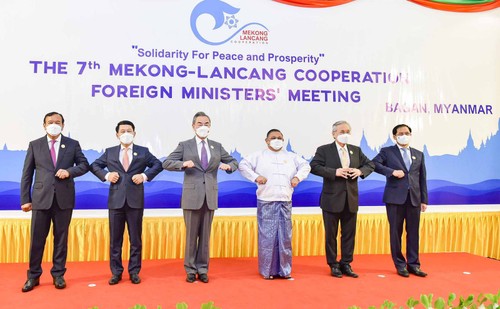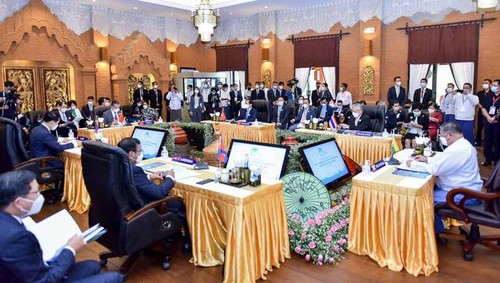 (Photo: baoquocte.vn) (Photo: baoquocte.vn) |
The Mekong-Lancang Cooperation was established on March 23, 2016 for cooperation between the riparian states of the Lancang River and Mekong River. The Lancang is part of the Mekong that flows through China. Cambodia, Laos, Myanmar, Vietnam and Thailand are five downstream countries of the Mekong River. Among 10 cooperative mechanisms in the Mekong Subregion, the MLC has emerged with many advantages and great expectation.
MLC maintains effective and substantive cooperation
The 7th MLC meeting in Myanmar acknowledged its contributions to regional cooperation and development particularly during the COVID-19 pandemic. The Ministers adopted a Joint Press Communiqué and four joint statements on strengthening agricultural cooperation, disaster prevention, customs and trade facilitation, and exchanges between MLC civilizations.
MLC cooperation will focus on economic recovery and development through enhanced connectivity, trade, digital economy, production capacity, resilient supply chain, facilitating trade, and customs clearance. It will also cooperate in disaster management, environmental protection, climate change adaptation, and sustainable use of water resources. Health security will be enhanced, especially improving the ability to control and prevent epidemics, the profession of medical personnel, and cooperation in traditional medicine. People-to-people exchange will be strengthened through cultural activities, tourism, media, sports, education, and human resource development.
Amidst regional and global uncertainty, the meeting emphasized the principles of consensus, equal cooperation, mutual consultation, sharing benefit, and respecting the United Nations Charter and international law in accordance with the laws and regulations of each country.
MLC Ministers agreed to enhance their cooperation toward fostering friendly neighborliness, contributing to member countries’ socio-economic development, building the ASEAN Community, and implementing sustainable development goals by 2030.
In recent years the Mekong region has witnessed tremendous changes. But along with economic development in member countries, the Mekong River delta is facing major environmental problems. The MLC has proposed a series of economic and technical solutions, completed large infrastructure projects, and carried out hundreds of technical assistance projects. Member countries have established specialized cooperative centers and organized policy forums.
Since the 6th Foreign Ministers’ Meeting, MLC has recorded positive results even during the COVID-19 pandemic. They successfully organized the 2nd Mekong-Lancang Water Resources Forum, a joint research on hydrometeorology and disaster prevention, a conference of tourist city alliance, and many projects using the Mekong-Lancang Special Fund in 2021.
Two-way trade between Mekong countries and China reached nearly 400 billion USD last year, up 23 percent compared to 2020 despite difficulties caused by the pandemic.
 The 7th Mekong-Lancang Cooperation (MLC) Foreign Ministers’ Meeting in Bagan, Myanmar (Photo: baoquocte.vn) The 7th Mekong-Lancang Cooperation (MLC) Foreign Ministers’ Meeting in Bagan, Myanmar (Photo: baoquocte.vn) |
Vietnam respects and contributes to MLC
Since the MLC’s establishment, Vietnam has actively contributed to its management for the effective and sustainable use of water resources, which is core cooperation among 6 countries.
Vietnam’s proposal to establish a hotline to handle emergency in the Mekong River has been supported and operated by other countries.
At the 7th meeting Vietnam recommended four groups of cooperative measures. The initiatives include strengthening customs cooperation and trade facilitation in order to address goods congestion and ensure the circulation of goods and services; improving clean energy production and storage capacity, and applying high technology to smart agriculture and climate change response; enhancing cooperation in managing and using water resources in a sustainable manner, especially speeding up the building of a MLC action plan for water resources collaboration in the 2023-2027 period; and promoting people-to-people exchange through recovering and expanding tourism activities, cooperation among local administrations, and organization of culture, sports, and communications events, and the empowerment of women and youngsters.
Maintaining cooperation momentum is a challenge for a multi-lateral mechanism which requires efforts of all members. Vietnam prioritizes practical cooperation to create visible changes in core issues, such as water resource security for sustainable development.